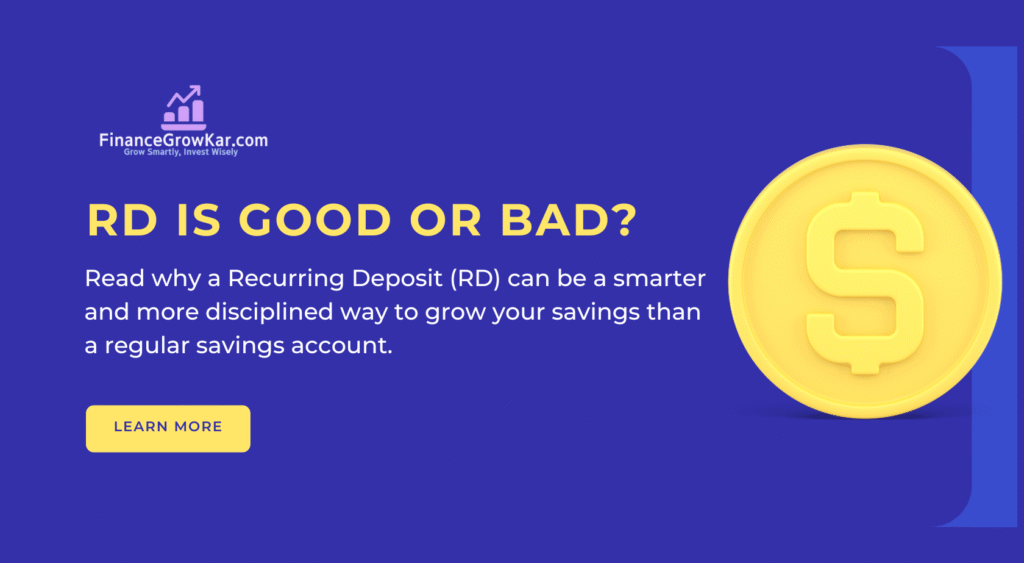Hello, I’m Adesh. Over the years, I’ve opened several Recurring Deposit (RD) accounts to enhance my financial growth and learning. Based on my experiences, I want to share with you why an RD might be a better choice than a regular savings account.
Understanding Recurring Deposits and Savings Accounts
Before diving into the reasons, let’s clarify what these two financial instruments are.
What Is an RD Account and Its Benefits?

A Recurring Deposit (RD) is a type of term deposit offered by banks. In an RD, you deposit a fixed amount every month for a predetermined period. At the end of this period, you receive the total amount you deposited along with the interest earned. This method encourages regular savings and offers a disciplined approach to accumulating wealth.
Benefits of an RD Account:
- Higher Interest Rates: RDs typically offer better interest rates compared to regular savings accounts.
- Fixed Returns: The interest rate is fixed at the time of opening the RD, ensuring predictable returns.
- Flexible Tenure: You can choose the duration of the RD based on your financial goals.
- Low Risk: RDs are considered safe as they are not subject to market fluctuations.
Difference Between RD and Savings Account
While both RDs and savings accounts are tools for saving money, they function differently.
- Savings Account: Allows you to deposit and withdraw money anytime. The interest rates are generally lower, and the primary purpose is to provide liquidity.
- Recurring Deposit: Requires fixed monthly deposits for a specific period. Withdrawals before maturity may attract penalties. The focus is on disciplined savings with higher interest earnings.
1. Higher Interest Rates
One of the main advantages of an RD over a savings account is the interest rate.
Interest Rates Comparison
- Savings Account: Typically offers lower interest rates, often ranging between 2% to 4% per annum.
- Recurring Deposit: Generally provides higher interest rates, comparable to Fixed Deposits (FDs), ranging from 5% to 7% per annum, depending on the bank and tenure.
Impact on Savings Growth
Higher interest rates mean your money grows faster in an RD. For example, if you deposit ₹5,000 monthly in an RD with a 6% interest rate for 2 years, you’ll earn more compared to keeping the same amount in a savings account with a 3% interest rate.
2. Disciplined Saving Habit
RDs instill a habit of regular saving, which is crucial for financial stability.
Encouraging Regular Deposits
By committing to fixed monthly deposits, you cultivate financial discipline. This routine helps in budgeting and ensures a portion of your income is consistently saved.
Goal-Oriented Savings
RDs are excellent for goal-based savings. Whether you’re planning for a vacation, purchasing a gadget, or building an emergency fund, RDs provide a structured path to reach your financial goals.
3. Fixed Returns and Safety
RDs offer predictable and secure returns, making them a reliable investment choice.
Guaranteed Returns
Unlike market-linked investments, RDs provide assured returns. The interest rate is fixed at the time of opening the RD, so you know exactly how much you’ll receive at maturity.
Low-Risk Investment
RDs are not subject to market volatility, making them a safe option for conservative investors. Your principal and interest are secure, provided you adhere to the deposit schedule.
4. Flexibility in Investment
RDs offer flexibility in terms of investment amounts and tenure.
Choosing Investment Amount
You can start an RD with a relatively small amount, making it accessible for individuals with varying income levels. This flexibility allows you to choose an amount that fits your budget without financial strain.
Selecting Tenure
RDs come with various tenure options, typically ranging from 6 months to 10 years. This allows you to align your RD with your financial goals and time horizon.
5. Better Returns Compared to Savings Accounts
When comparing the growth of your savings, RDs often outperform regular savings accounts.
Compounding Effect
The interest in RDs is compounded quarterly, leading to better growth of your savings over time. This compounding effect enhances the overall returns compared to the simple interest offered by savings accounts.
Real-Life Example
Consider depositing ₹3,000 monthly in an RD with a 6.5% interest rate for 3 years. At maturity, you’ll have a substantial amount, significantly more than if the same amount was kept in a savings account with a lower interest rate.
Advantages and Disadvantages of Recurring Deposit Account
While RDs have numerous benefits, it’s essential to be aware of their limitations.
Advantages of RD Account
- Higher Interest Rates: As discussed, RDs offer better interest rates than savings accounts.
- Disciplined Savings: Encourages regular saving habits.
- Fixed Returns: Provides assured returns, aiding in financial planning.
- Flexibility: Allows selection of investment amount and tenure.
Disadvantages of Recurring Deposit Account
- Liquidity Constraints: Premature withdrawals are not permitted, and closing the account before maturity may result in penalties.
- Fixed Monthly Commitment: Missing a monthly deposit can attract penalties and disrupt your savings plan.
- Tax Implications: Interest earned on RDs is taxable as per your income slab, and TDS may be deducted if interest exceeds a certain threshold.
RD vs Savings Account: A Comparative Overview
To summarize, here’s a comparison between RDs and savings accounts:
| Feature | Recurring Deposit (RD) | Savings Account |
| Interest Rates | Higher (5%-7%) | Lower (2%-4%) |
| Deposit Frequency | Fixed monthly deposits | Flexible |
| Liquidity | Limited | High |
| Returns | Fixed and predictable | Variable and lower |
| Risk | Low | Low |
Is RD a Good Investment?
RDs are a good investment for individuals seeking:
- Safe and Assured Returns: Without exposure to market risks.
- Disciplined Savings: Regular monthly deposits help in building a substantial corpus.
- Short to Medium-Term Goals: Ideal for goals ranging from 1 to 5 years.
However, for long-term wealth creation, exploring other investment avenues like mutual funds or stocks might be beneficial, considering the impact of inflation on RD returns.
RD vs FD: Which Is Better?
Both RDs and Fixed Deposits (FDs) have their merits.
- RDs: Suitable for individuals who prefer saving smaller amounts regularly.
- FDs: Ideal for those with a lump sum amount to invest for a fixed tenure.
Choosing between the two depends on your financial situation and goals. For me, RD worked beautifully because I was just starting out and didn’t have a large lump sum to lock away. I wanted to save a small fixed amount each month and still earn more interest than what a regular savings account offered. That’s why RD is better than FD for beginners like I was.
Why RD is Better Than FD for Some People
Let me explain this with a simple example from my own experience.
A few years ago, I had just started working. I didn’t have ₹50,000 or ₹1,00,000 lying around to put in a Fixed Deposit (FD). But I could manage ₹5,000 per month. So, I opened an RD.
That monthly commitment helped me save steadily. After 2 years, I had a decent amount with interest, without feeling the burden of investing a big amount in one go. That’s why RD is better than FD when you’re starting small or want to build a habit of saving.
When FD Can Be Better
- If you already have a lump sum amount, FD gives better overall returns in less time.
- FDs offer flexible tenures and sometimes higher interest for senior citizens.
But again, if you’re building your savings slowly, an RD is a great first step.
Benefits of RD Account in SBI (and Other Banks)
SBI (State Bank of India) is one of the most trusted banks in India, and it offers some great features with RDs.
Key Benefits of RD Account in SBI:
- Flexible Tenure: From 12 months up to 10 years.
- Auto-Debit Facility: The amount gets debited automatically from your savings account, so you never miss a deposit.
- Good Interest Rates: Often between 6% to 7% depending on the tenure and current rates.
- Premature Withdrawal: Allowed, but with a small penalty.
- Safe and Secure: Backed by the government, SBI is a safe option for deposits.
Many other banks like HDFC, ICICI, Axis, and even small finance banks like Ujjivan also offer similar features, but SBI remains a preferred choice for many due to its reliability.
Is RD Beneficial? Let’s Make It Clear
Yes, RD is beneficial if you:
- Want to save regularly.
- Don’t want to take risks.
- Prefer a fixed income investment.
- Have a short-term or mid-term goal.
I personally found RD very helpful in achieving small goals – like buying a laptop, planning a trip, or even saving for a festival.
Is RD Safe?
Absolutely. RDs are one of the safest investment options. They are not linked to the stock market or any risky instruments. Your money is deposited in a government-regulated bank, and you know exactly how much you will receive at the end of your tenure.
This makes RDs a safe and stable choice for students, working professionals, and even homemakers.
Importance of RD Account in Personal Finance
Let’s not overlook the importance of RD account in shaping good financial habits.
Why I Believe RDs Are Important:
- Encourages Habitual Saving: You learn to set aside a fixed amount regularly.
- Teaches Financial Discipline: You begin to plan your monthly expenses around your savings.
- Supports Goal-Based Planning: Want to buy a gadget in 2 years? Start an RD.
- Makes You Interest-Aware: You begin to compare and understand interest rates and how money grows over time.
This may sound simple, but these lessons go a long way in improving your financial literacy.
TD vs RD: What’s the Difference?
You might come across the term TD (Term Deposit) and wonder how it’s different from an RD.
Here’s the difference:
- TD is a broader term that includes both RDs and FDs.
- RD is a type of TD where you deposit monthly.
- FD is also a type of TD where you deposit a lump sum once.
So technically, RD is a kind of Term Deposit. But the key difference is in how you invest – monthly (RD) vs one-time (FD).
Real-Life Benefits of RD I Experienced
Let me be honest – I wasn’t always a money-smart person. But when I started using RDs, here’s what changed:
- I learned to set aside money before spending.
- I felt the joy of watching my balance grow, even with small deposits.
- I gained confidence to move into other investment options like mutual funds and SIPs, once I had built discipline.
So, if you ask me “Is RD a good investment?”, I would say it’s one of the best places to start.
RD is Good or Bad? Final Thoughts
Every financial tool has its use. In the right situation, RD is good. In some cases, it may not give very high returns, so people call it bad. But for:
- People who are just starting to save
- People who want no-risk investments
- People with short-term goals
RD is a good investment.
You must match the tool with your needs and goals. That’s what I did.
I’ve used RDs in multiple banks, including SBI, ICICI, Axis, and HDFC. Each one taught me something about money. I saved up for holidays, gadgets, and even created emergency funds through RDs.
This article was written based on real experience, real returns, and real growth.
If you’re someone who’s struggling to build a saving habit or unsure where to start – start with an RD.
And if you’re wondering – “rd is good or bad?” or “is rd beneficial?”, I hope I’ve given you enough to think about.
Did this article help you understand how and why RD is better than savings account? Do you have any questions about how to start your own RD? Or are you confused between rd vs savings account or rd is better than fd?
Drop your questions in the comment box below. I will personally read and reply to every comment. Also, if you liked this post and found it helpful, please share this with your friends and family on WhatsApp, Facebook, or Twitter.

Er. Adesh Saxena is a Computer Science engineer, corporate trainer, and speaker with 14+ years of experience in digital marketing, IT, BFSI, data, and cybersecurity. In 2020, he faced a financial loss of over ₹1 crore, which changed his life. Determined to rebuild, he learned wealth-building strategies from top finance experts. Now, through FinanceGrowKar.com, he shares practical money lessons to help others grow financially.





great post! rd really helps build savings slowly and safely. thanks for explaining it so well. 👍
thanks Jaspreet… glad you it helps you
You explained everything in a very simple way…. now i feel more confident to start my own rd. thanks a lot!
Thanks Aamir… do not forget to subscribe newsletter